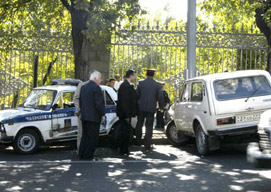We always deal with traffic field. If we are not so happy to be a traffic policeman or a driver, at least we are pedestrians. We have to deal with this every day. This means that traffic legislation must be regulated and stated clearly. But Armenia didn’t have its own law regulations till August, 2005 and had to follow the law regulations of the Soviet Union. Now we have our own legislation in this field, but the field has not been regulated yet. Very few people are aware of this new code, because there haven’t been public hearings and information programs dedicated to this code. “We didn’t have enough financial support to inform citizens”, – said the head of traffic police control board Albert Soghomonyan.
All drivers know about the “informal rules” of this field. Except the official rules, there are also non-official rules, which are more important for drivers.
These informal rules are: “you have to pay 150-500 USD to get a driver’s license. It depends on how and when you want to get it. Only 50 dollars of this sum is official payments. Whenever they stop your car you have to pay them at least 500 dram, this is a fixed informal rule. If they start to complain more, this means that they want more. And if you have violated the traffic law regulations you have to pay more. If they take your car to the police station you will lose a lot of money because it is very expensive to take it out of there. The traffic policemen are obliged to give ten tickets every day in order to transfer money to the budget. Besides these ten tickets they have to pay money to their bosses at the end of each day. This is not a secret for anyone. Policemen pay their boss, their boss pays to his boss, and so on up to the top management”, -said Karen Simonyan (an experienced driver of 27 years). What kind of influence is this new law going to make on those post-soviet policemen? “This new law regulates the relations in the traffic field, defines the principles of traffic security…as well as the rights and responsibilities of drivers”, – as stated in the first article of the code. Mr. Soghomonyan said the same thing when answering to our question. The previous code regulated the field too, but it created good conditions for corruption too. Will the new code support the decrease in the level of corruption ? This was the key issue that interested most people. “I think it will”, – said the representative of traffic police. “This new code creates more risks for corruption. If we don’t stop these shortcomings this change will have no results. If your car is brought to the police station illegally, the first five days are free for parking, then you will have to pay 500 dram per day. Now this point doesn’t exist any more, but they still ask people to pay this money. They pay about 50-100 dollars for all this”, – said the president of “Achilles” NGO Edward Hovhannisyan. “Do you have any facts? If the driver doesn’t agree with the officer he can apply to court to solve this problem. No one can take money from a person who doesn’t offer that money”, – said Mr. Soghomonyan. But the court usually bases on what police officers say, their word is to be considered by the court. So drivers prefer to pay 1.000-2.000 dram and sometimes even more so as not to argue and aggregate nerves or make the situation more difficult.
The new code provides a right to stop cars in case policemen suspect that there are criminals and wanted people in those cars or he has enough proof to think the driver is drunk. But it is not clearly stated whether this “enough proof” is a justified fact or just the suspect of the policeman. I think this justification of the policemen’s suspect creates very good conditions for corruption.

